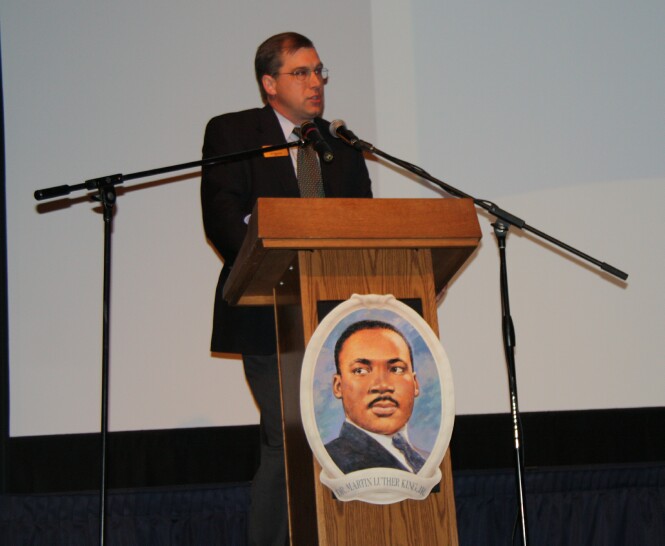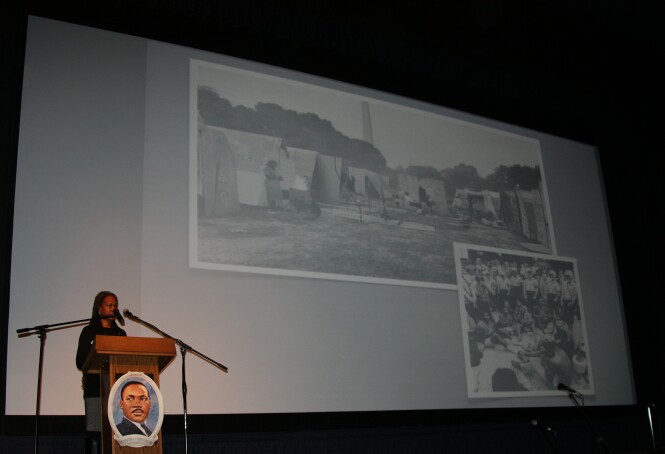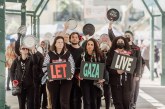Keynote Speaker Relates Poor People’s Campaign to Occupy Movement

Mayor Joe Krovoza used his comments, opening the 2012 MLK Day Celebration in the City of Davis, to condemn the pepper-spraying incident that occurred last November.
“Intolerance does continue, the reasons for us to gather continue as well,” the mayor said to a capacity crowd at the Varsity Theater on Monday. “War still distracts us from creating social justice, at home it still drains our resources. There are many ways in which we will continue to fight intolerance and [fight for] social justice creation in Davis.”
“Last year I discussed Martin Luther King Jr.’s legacy and talked about what it meant to me and to our community,” Mayor Krovoza said. “I observed that what we protect here in Davis and across the country is the echo of Dr. King.”
“We seek to make sure that the echo does not follow the laws of physics, but rather that we work here in our community to amplify and amplify his message over and over.”
“I do want to note with a bit of apology and sadness, that in November our community did become a symbol,” he said, “unfortunately a symbol for a violent response to a non-violent protest.”
“We acted inappropriately towards students who were seeking to make sure that public education truly remains public,” he continued.
“The goal of making sure that public education truly remains public is absolutely at the core of creating an equal and just society,” Mayor Krovoza said.
He continued: “I think it’s therefore with that backdrop that I would like to ask all of us here today, that for one more reason, the reason of our community being the focal point, we redouble our efforts to create the quality in our community to understand our students and all of our populations in Davis and to reach out and fix those inequalities that we can.”
The message of the mayor was not lost on keynote speaker Lecia Brooks, from the Southern Poverty Law Center, who flew to Davis from Alabama to talk about not only about the legacy of Dr. Martin Luther King, but also contemporary issues.
Lecia Brooks talked about one of the last campaigns that Martin Luther King Jr led, the poor people’s campaign, where the organizers not only pushed for freedom and equal rights, but also crafted an economic bill of rights.

“They had some demands, they wanted the government to prioritize helping the poor with an anti-poverty package that included housing and guaranteed income for all Americans,” she told the audience at the Varsity Theater.
“As we know, Dr. King was assassinated in Memphis, Tennessee before that march took place,” she said. The march went on anyway, and they would set up ‘Resurrection City.’ “
It was a settlement of tents and shacks. “They stayed there for weeks,” Ms. Brooks said. “It is important to note that this was the last time the Washington Mall was occupied.”
“Although 50,000 people participated in the People’s Campaign March, it was deemed largely a failure. The people who deemed it a failure were the ones who participated because they had grown weary of protesting and frustrated by the lack of immediate change,” she said adding, “Sound familiar?”
“Thankfully though, many were encouraged and inspired by the activism and the real change that took place during the modern American Civil Rights Movement,” Lecia Brooks continued. “I believe this inspiration continues today in the activism that we see taking place around the country and, dare I say, the non-violent protests that took place at UC Davis.”
“I applaud the students at UC Davis, and I also applaud the mayor and you-all for, like, recognizing that something went wrong,” Ms. Brooks said.
She added that it took a tremendous amount of time for the nation to recognize the wrongs of the Jim Crow era.
“How long did it take Governor Wallace to acknowledge any wrongdoing?” she asked, adding, “So thank you.”
—David M. Greenwald reporting






I was in the audience and surprised then proud that Joe spoke of Nov incident. Thanks Joe for having the courage and insight to do that publically ‘for us, the community’.
[quote]“I do want to note with a bit of apology and sadness, that in November our community did become a symbol,” he said, “unfortunately a symbol for a violent response to a non-violent protest.”
“We acted inappropriately towards students who were seeking to make sure that public education truly remains public,” he continued.
“The goal of making sure that public education truly remains public is absolutely at the core of creating an equal and just society,” Mayor Krovoza said.[/quote]
Nicely said!
[quote]Lecia Brooks talked about one of the last campaigns that Martin Luther King Jr led, the poor people’s campaign, where the organizers not only pushed for freedom and equal rights, but also crafted an economic bill of rights.
“They had some demands, they wanted the government to prioritize helping the poor with an anti-poverty package that included housing and guaranteed income for all Americans,” she told the audience at the Varsity Theater.[/quote]
“Guaranteed income for all Americans”? Really? So those that choose not to work can “earn” a living? Where would be the incentive to work? How could we ever afford something like this? Perhaps this was taken out of context, and what was meant is that no one should be denied basic necessities? This one has me baffled…
It has you baffled? First of all, that an argued from 45 years ago. Second, given what we pay for crime and all other things related, I wonder if guaranteeing some sort of minimum standard of living really would be more expensive.
[quote]It has you baffled? First of all, that an argued from 45 years ago. Second, given what we pay for crime and all other things related, I wonder if guaranteeing some sort of minimum standard of living really would be more expensive.[/quote]
It was an argument 45 years ago, but raised in a conversation today. Second, the very fact that you are raising an argument that it might be a good idea today makes it clear some consider it should be under contemplation. If you are arguing ideally no one should go hungry or go without a place to stay, I’m with you. If you are arguing everyone should be handed a wage without working for it, that is where we part company…
I raised in the article as putting context to her comparison of the campaign that was similar to the occupy movement rather than advocacy.
If you are asking my personal view, I think we could incorporate you admonition against wages without working into a guarantee of food, shelter, and other amenities.
ERM
I would suggest that one way to bridge this apparent gap between providing a minimal safety net of food, clothing , shelter and medical care for all and wages without work might be to redefine what we consider work. Caring for children and one’s parents or other relatives in need is certainly work, but we do not choose to compensate for it as though it were work. Pursuing ones education is work, but we choose to charge ever increasing amounts for it instead of rewarding the diligence and effort needed to succeed educationally.
I think providing an incentive for activities that benefit the society as a whole would be a far more compassionate and effective strategy for improving our overall well being than arbitrarily defining winners and losers solely on the basis of ability to amass material wealth.
[quote]“It is important to note that this was the last time the Washington Mall was occupied.”[/quote]
Interesting stuff. Here’s an interesting article about “Resurrection City”:
[url]http://articles.washingtonpost.com/2011-12-03/local/35284994_1_resurrection-city-demonstrators-civil-rights-leaders[/url]
Also, she said “the last time,” implying that there has historically been a number of occupations on the Mall. That’s accurate, except I think the number of occupations has been two, in terms of long-term occupations. The other occupation was the “Bonus Army” in 1932:
[url]http://www.loc.gov/exhibits/treasures/trm203.html[/url]